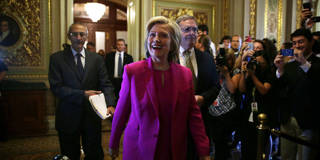Fake news – “active misinformation” that is packaged to look as if it comes from a serious news site – is a threat to democratic institutions. In the Internet age, is it time for the legal pendulum to swing back toward the offense of criminal libel?
PRINCETON – About a week before the United States presidential election last November, someone posted on Twitter that Hillary Clinton was at the center of a pedophilia ring. The rumor spread through social media, and a right-wing talk show host named Alex Jones repeatedly stated that she was involved in child abuse and that her campaign chairman, John Podesta, took part in satanic rituals. In a YouTube video (since removed), Jones referred to “all the children Hillary Clinton has personally murdered and chopped up and raped.” The video, posted four days before the election, was watched more than 400,000 times.
Emails released by WikiLeaks showed that Podesta sometimes dined at a Washington, DC, pizza restaurant called Comet Ping Pong. Apparently for that reason the child-sex-ring accusations focused on the pizza restaurant and used the hashtag #pizzagate. The allegations were frequently retweeted by bots – programs designed to spread certain types of messages – contributing to the impression that many people were taking “Pizzagate” seriously. The story, amazingly, was also retweeted by General Michael Flynn, who is soon to be President-elect Donald Trump’s national security adviser.
Even after Trump’s election – and despite debunking by the New York Times and the Washington Post – the story continued to spread. Comet Ping Pong was harassed by constant, abusive, and often threatening phone calls. When the manager approached the DC police, he was told the rumors were constitutionally protected speech.

PRINCETON – About a week before the United States presidential election last November, someone posted on Twitter that Hillary Clinton was at the center of a pedophilia ring. The rumor spread through social media, and a right-wing talk show host named Alex Jones repeatedly stated that she was involved in child abuse and that her campaign chairman, John Podesta, took part in satanic rituals. In a YouTube video (since removed), Jones referred to “all the children Hillary Clinton has personally murdered and chopped up and raped.” The video, posted four days before the election, was watched more than 400,000 times.
Emails released by WikiLeaks showed that Podesta sometimes dined at a Washington, DC, pizza restaurant called Comet Ping Pong. Apparently for that reason the child-sex-ring accusations focused on the pizza restaurant and used the hashtag #pizzagate. The allegations were frequently retweeted by bots – programs designed to spread certain types of messages – contributing to the impression that many people were taking “Pizzagate” seriously. The story, amazingly, was also retweeted by General Michael Flynn, who is soon to be President-elect Donald Trump’s national security adviser.
Even after Trump’s election – and despite debunking by the New York Times and the Washington Post – the story continued to spread. Comet Ping Pong was harassed by constant, abusive, and often threatening phone calls. When the manager approached the DC police, he was told the rumors were constitutionally protected speech.